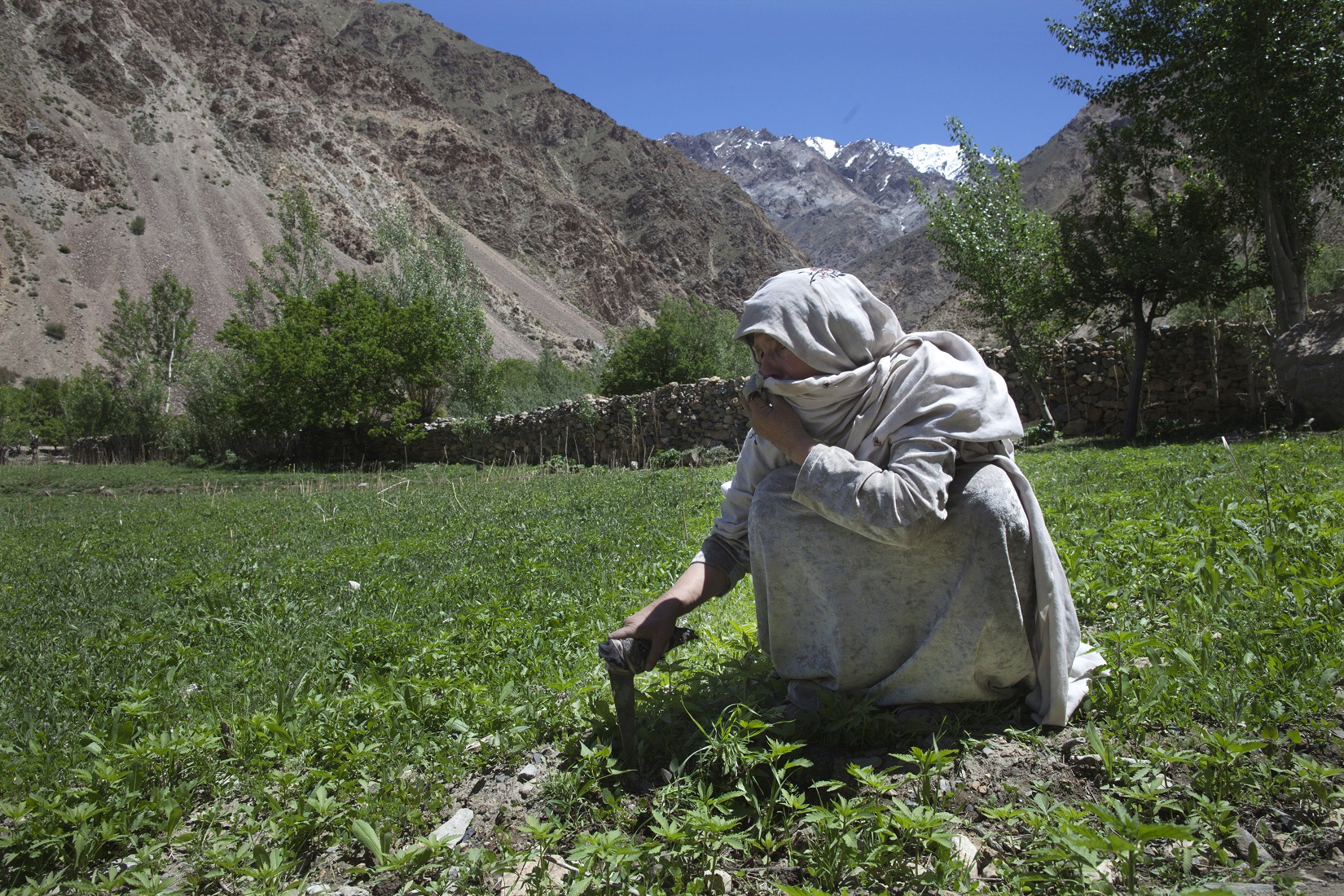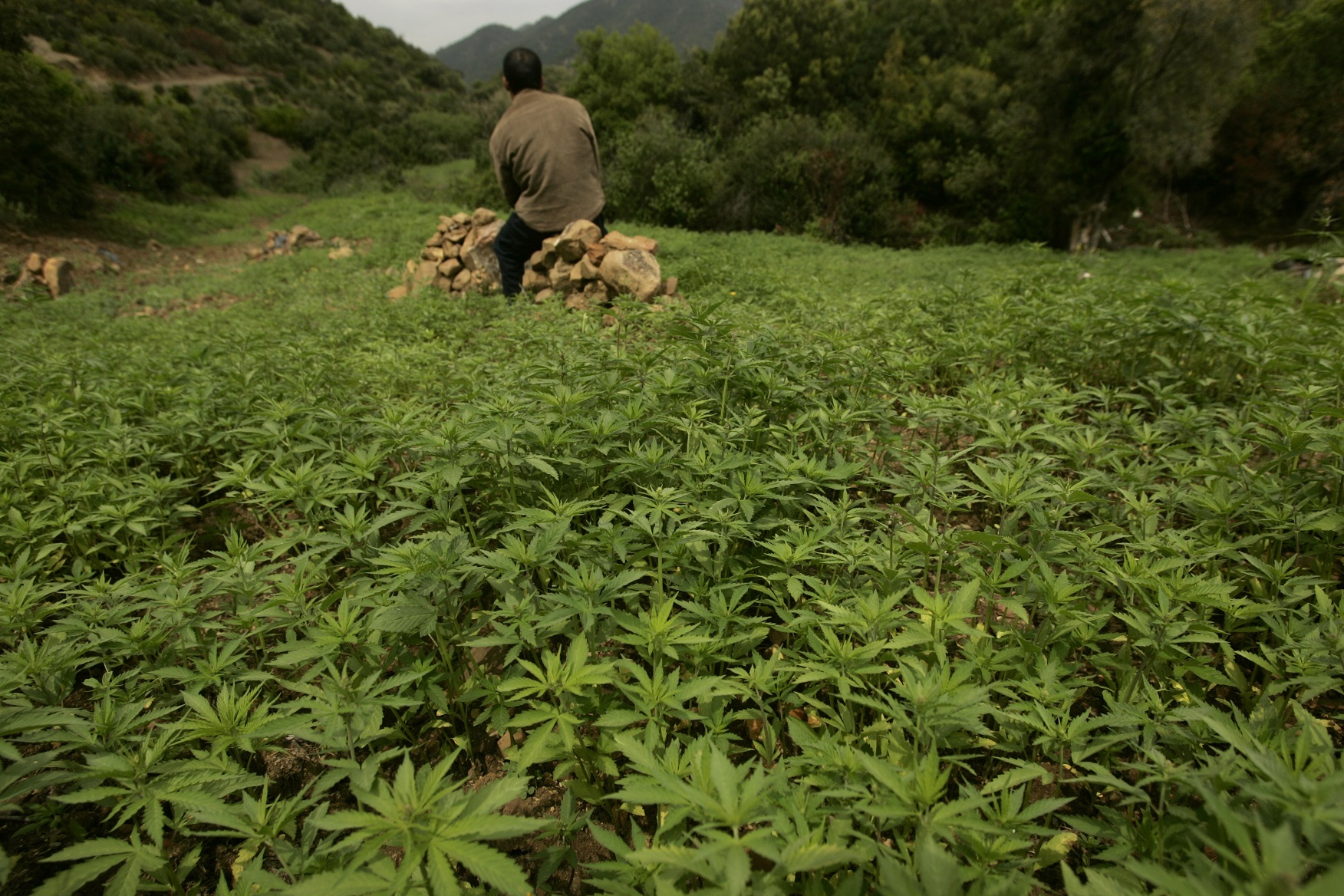"إذا لم أزرع هذه القطعة الصغيرة سأموت جوعا أنا وابني الصغير".. لم أتذكر من كل الشهادات التي جمعتها طيلة سنوات من العمل حول مواضيع زراعة القنب الهندي في المغرب، سوى ما قالته امرأة وجدتها في حقلٍ "للكيف" (الاسم المحلي للنبتة)، تصحب رضيعها الصغير، وتحرث الأرض بتفانٍ في بواكير الصباح.
مضت خمس سنوات على ذلك التحقيق الذي أنجزته عن الصراع حول مياه السقي المفضي إلى الموت في مناطق زراعة الحشيش، لكن الشهادة تحاصرني كلما تابعت تحقيقا جديدا للصحافة الإسبانية أو الفرنسية.

يزرعون الحشيش لا الموز
تقول القناة الإسبانية إن زراعة الحشيش تدرّ على المزارعين ملايين الدولارات سنويا. وكي يكتمل بؤس المشهد، تصور شهادة تقول إنها لفلاح "كبير" استطاع خلال سنوات قصيرة فقط أن يراكم ثروة هائلة.
عملتُ لمدة طويلة حول قضايا القنب الهندي، ولم يسبق لمزارع واحد أن قبل نشر اسمه أو صورته كاملة، وفي أقصى لحظات التسامح يطلب منك أن تخفي وجهه أو تموّه شهادته. أتذكر أنه في المرة الأولى التي وصلتُ فيها إلى بلدة تسمى "باب برد" تابعة لإقليم الشاون شمالي المغرب، لم أكن أعرف اسم واحد ممن سألتقيهم عدا صديق كان مكلفا بضبط مزاجهم حينما تنفلت مني كلمة أو عبارة لا تناسب السياق الموسوم بالخوف والتردد.. إنهم يزرعون نبتة محظورة ولا يزرعون الموز.
لا يريدون الظهور في وسائل الإعلام، لأنهم متهمون على الدوام وفقراء على الدوام، يتضرعون إلى الله كل يوم أن تجود السماء ببعض المياه كي تزهر "نبتة الحياة"، لكن لا أحد منهم يتوفر على عقارات فارهة كما تتوفر عليها شبكات الاتجار الدولي في المخدرات، ولا أحد منهم أيضا يحوز أرصدة "سمينة" في البنوك، كما روجته وتروجه وسائل الإعلام الإسبانية والفرنسية خصوصا.
في تحقيقات لقناة "أم6" (M6) الفرنسية ولجرائد وقنوات إسبانية، كنت أنتظر أن يثير الصحفيون كيف تتدخل شبكات الاتجار الدولي بالمخدرات في السيطرة على حصص الفلاحين الصغار من المياه التي يسقون بها "الكيف" وعطشهم.. كنت أبحث عن لمسة إنسانية، تقترب من هؤلاء الفلاحين الذين يواجهون منذ عقود ظلم الدولة وجشع الأباطرة الكبار.. أن تقترب أكثر من المبحوث عنهم -هؤلاء الهاربين من العدالة- بتهمة واحدة: زراعة "الكيف"، إما بشكايات كيدية توظف في الصراع السياسي، أو لأن القانون المغربي يمنع زراعتها ورعايتها.
لكني كنت كمن ينتظر معجزة مستحيلة التحقق.. يعبُر أمامي شريط كامل من المشاهد التي تختصر مأساة فلاحين صغار لا يجدون حتى قوت يومهم، خاصة عندما حاصرت الدولة التجارة الدولية العابرة للقارات. وتعبُر أمامي مشاهد مجتزأة من تحقيقات تعج بالأحكام الجاهزة ونحت صورة يعشقها هؤلاء الذين حولوا الاستشراق إلى "عجل مقدس".
في مبادئ الصحافة البسيطة، كان على البرامج الاستقصائية أن تجيب على الأسئلة التالية: من المستفيد الأول من هذه التجارة؟ كيف تتحول مآسي المبحوث عنهم في قضايا المخدرات إلى أصوات انتخابية حاسمة؟ وكيف تتحكم المافيات في رقابهم؟ وكيف تحولت منطقة الشمال إلى معتقل احتياطي كبير يحوي بين ثناياه آلاف المبحوث عنهم؟ كيف يعيش هؤلاء وأين يقيمون؟ ولمَ تتلكأ السلطات في اعتقالهم إذا كانوا قد اقترفوا جرائم تستوجب السجن؟ ولمَ يتودد إليهم أباطرة الانتخابات؟
الخيال عدو الحقيقة
لكن هؤلاء يحبون السينما والأفلام الخيالية أكثر من الانحياز إلى الحقيقة. قبل شهور، أصدرت المديرية العامة للأمن الوطني بلاغا حول واقعة تصوير برنامج تلفزيوني في طنجة مع من وصفه الصحفي بأشهر تاجر كوكايين في الشمال المغربي.. كنتُ أخمّن -بل كنت متيقنا- أن القصة لا يمكن تصديقها، وأنها ذات نفس تخيّلي.. أعرف ذلك لأن للإعلام الإسباني والفرنسي -على نحو خاص- سوابق في الادعاء وصنع البهارات والبتر والحذف والإقصاء.. وحين صدر البلاغ قلت في نفسي: هل هناك تاجر كوكايين في العالم يربح المليارات، يظهر على شاشة التلفزيون عاريا وفي مكان عام؟
منذ زمن بعيد يريد جزء من الإعلام الغربي أن يصور المغرب وحده "لا شريك له" في إنعاش تجارة الحشيش، وأن زعماء الشبكات الإسبان والفرنسيين والإيطاليين ينعشون "تجارة الموز"، بل إن الطور الثاني من هذه الخطة انتقل إلى اختلاق قصص وفبركة وقائع حول انتشار الكوكايين في مدينة لا تبعد سوى ساعة عن إسبانيا.
إنها عادة قديمة على كل حال، فقد سبق لقناة فرنسية أن أعدت ما أطلقت عليه تحقيقا يكشف طرق تهريب الحشيش عبر البحر إلى الضفة "الغنية" من البحر المتوسط، وتسرد في قصتها أن بعض رجال السلطة يتواطؤون مع تجار الحشيش لتسهيل عملية التهريب. ماذا أيضا؟ الحشيش المغربي يهرّب في واضحة النهار دون محاسبة من أحد، ولأن ثمنه هبط في السوق خلال السنوات الأخيرة، فلم يبق للقناة الفرنسية في هذا التحقيق المشهود سوى أن تعلمنا كيف يزرع الكيف ويُشذب، وكيف يصل إلى أياد غير التي زرعته ورعته وفتحت صدورها لمواجهة السلطة.
استعملت القناة بعض التقنيات السينمائية والحبكة الممزوجة ببعض الموسيقى التصويرية كي توهم الجميع بأن الأمر يتعلق بتحقيق مهني غير مسبوق في تاريخ الصحافة. لكن القناة أو الصحفي الذي أنجز التحقيق -دون أي تحامل عليه- نسي أن يخبرنا ولو تلميحا، أن هؤلاء الذين يرعون هذه التجارة ويحمونها بكل الوسائل ليسوا كلهم مغاربة.. إنهم إسبان وإيطاليون وفرنسيون، ويمكن هنا أن تعود القناة بسهولة إلى التقارير التي أعدها الاتحاد الأوروبي كي تتأكد بنفسها أن الحشيش ليس على قلب واحد.
تناول القنوات العالمية -وخاصة الأوروبية منها- لملف الاتجار في "الكيف" أو زراعته بالمغرب، يكتسي لبوسا عجائبيا محبوكا بأحكام جاهزة غير صحيحة عن المزارعين والتجار، وفي الكثير من المرات كنت أتساءل: هل حقا هذه هي "كتامة" (المنطقة الأكثر شهرة لزراعة الحشيش) التي أعرف أهلها البسطاء وأشجارها المنهوبة وفقراءها الذين أنهكتهم صروف الدهر؟ وهل هذه هي الشاون بجبالها الوعرة وأناسها البسطاء الراضين بعيشتهم وبقدر اسمه "الكيف"؟

رغم القرب الجغرافي بين المغرب وإسبانيا وفرنسا، ورغم العلاقات الثقافية التي تجمع هذه الدول، يصر بعض الصحفيين على اعتبار المغرب بلدا للحشيش، تستهويهم تلك النظرة الاستشراقية السطحية التي رسمها كتّاب كثر، منهم للأسف مغاربة ممن تلقى سلعتهم رواجا منقطع النظير لدى جمهور يحب القصص الخيالية.. وإلا ما معنى أن يتحدث الصحفي الفرنسي عن تهريب الحشيش بين ضفتي المتوسط دون أن يشير -ولو مرة واحدة- إلى أن مواطنا فرنسيا كان وراء أخطر شبكات بيع الحشيش.
وباستثناء تحقيق يتيم لشبكة "بي.بي.سي" لم يخل هو أيضا من أحكام القيمة، لم تستفز الإعلام الغربي حال الكثير من المناطق والأقاليم المعروفة بزراعة الحشيش، ولكنه يصر كل مرة أن التجارة تدر الملايين من الدولارات على مزارعيها.
في كل فصل شتاء، تضطر الحكومة إلى فك الحصار المضروب عن المناطق التي حاصرتها الثلوج وقطعت كل أوصال الحياة فيها، وخلال هذا الوقت تكون كتامة والبلدات المجاورة خارج الحضارة لأيام. ولولا كاسحات الثلوج لظل السكان هناك في ذلك الصقع المنسي معزولين عن العالم يبحثون عن الحد الأدنى من شروط الحياة.
وقد درج الكثيرون على اتهام الفلاحين الصغار بتوسيع رقعة زراعة القنب الهندي والاغتناء الفاحش، وللأسف أيّد الإعلام الغربي هذه الصورة النمطية بدل تصحيحها.
والحقيقة أنه لو كان "الكيف" يخلق الثروة ويدر المليارات على الساكنة، لأصبح موسم الثلج موسما عاديا كما في أي دولة أوروبية، فتقرير الأمم المتحدة يتحدث عن عشرات الملايين من الدولارات تدرها زراعة الحشيش، لكنها تذهب في الأخير إلى مافيات الاتجار الدولي في المخدرات، بينما ينال الفلاحون "التهمة الأبدية".




















![Palestinian journalists attempt to connect to the internet using their phones in Rafah on the southern Gaza Strip. [Said Khatib/AFP]](/sites/default/files/ajr/2025/34962UB-highres-1705225575%20Large.jpeg)




















